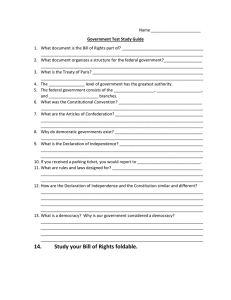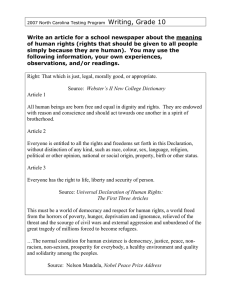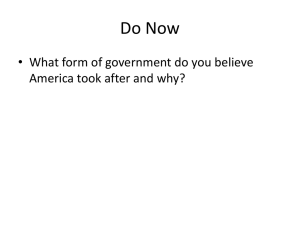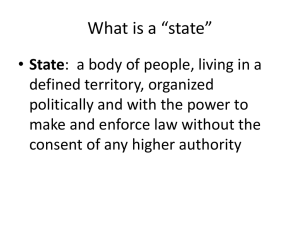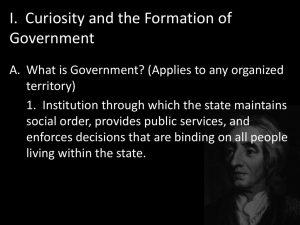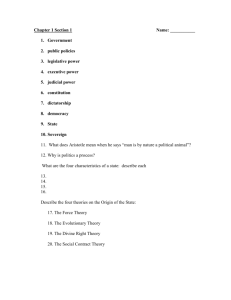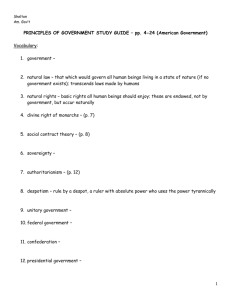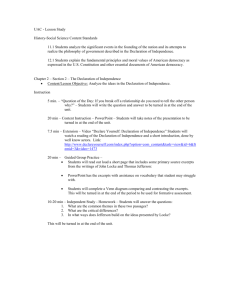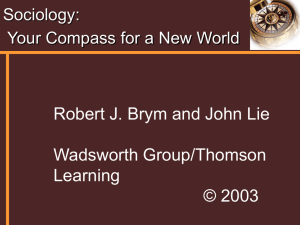Principles of Government Chapter 1 Notes
advertisement
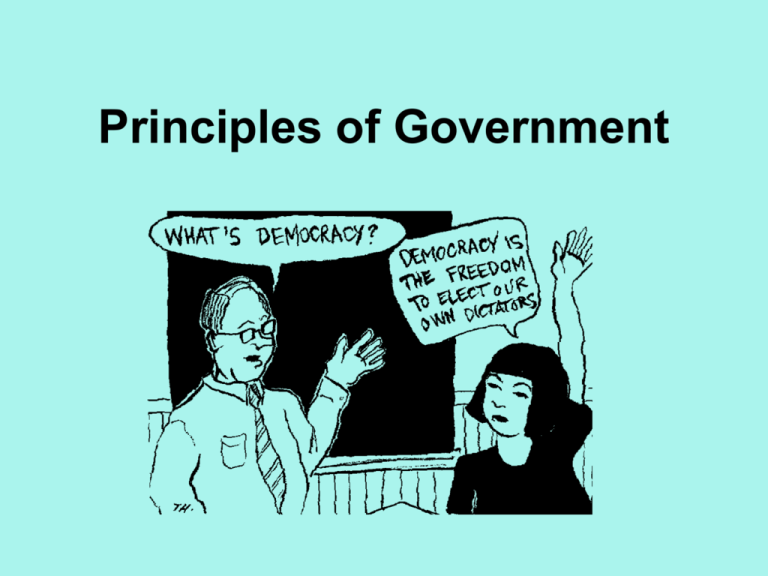
Principles of Government Brainstorm… • How many TYPES or FORMS of government can you list? FOUR ESSENTIAL FEATURES OF A STATE 1. POPULATION all the people who live in a state 2. TERRITORY the area within an established territory 3. SOVEREIGNTY authority to conduct internal affairs without seeking approval from a higher authority or other nations 4. GOVERNMENT through which the state maintains social order, provides public services, enforces the laws, and makes economic decisions MAJOR TYPES OF GOVERNMENT As identified by who holds the power: • In an AUTOCRACY, which can be a dictatorship or an absolute monarchy, where power and authority rests with a single individual. Ex: dictatorships—Cuba; absolute monarchies—Saudi Arabia and Jordan • In an OLIGARCHY, such as a communist country, a small group holds power in the government. Ex: China and North Korea • In a DEMOCRACY, the people hold the sovereign power of government. Ex: Presidential democracies-United States, Mexico, France, South Africa, most of Latin America Ex: Parliamentary democracies— Great Britain, Canada, Israel, Australia, Japan, India MAJOR TYPES OF GOVERNMENT As identified by structure or organization: • A unitary government is often described as a centralized government, where all powers belong to a single, central body. Most governments in the world are unitary. Ex: Great Britain, France, Syria • A federal government is one in which the powers of government are divided between a central government and several local government. Both levels of government act directly on the people through their own sets of laws, officials, and agencies. Ex: United States, Mexico, India BASIC PRINCIPLES OF AMERICAN DEMOCRACY 1. worth of the individual 2. equity of all persons 3. majority rule, minority rights 4. necessity of compromise 5. individual freedom Also important for any democracy… • free and open elections • every vote has equal weight • competing political parties • a market economy Where do democracies flourish? • in countries without extremes of wealth and poverty with a large middle class • the opportunity to control one's economic destiny provides a base for making independent political decisions Origins of the State • Force Theory the state is born out of force; a person or small group claimed control over an area and forced all within to submit to that person’s or group’s rule— the state is sometimes created out of an overthrow of government • Evolutionary Theory the state developed naturally over time from early family—like with tribes or clans who became tied to the land…and eventually a state was born • Divine Right Theory those of royal birth have the God-given right to rule; where people obeyed their ruler as they would their God—like the absolute monarchs of 15th - 18th century Europe, or the ancient Egyptians, the Maya and Aztecs, and even Japan until 1945 • Social Contract Theory the state arose out of voluntary acts of free will of the people; the state exists only to serve the people and the people themselves are the source of political power—this is what Thomas Jefferson meant by “consent of the governed” in the Declaration of Independence As a society, what can we do to encourage more people to participate in politics and government? Documents Project “Stepping Stones to the Constitution” 1. Magna Carta 2. Mayflower Compact 3. Fundamental Orders of Connecticut 4. English Bill of Rights 5. Two Treatises of Government 6. Common Sense 7. Virginia Declaration of Rights 8. Declaration of Independence 9. Virginia Statute of Religious Freedom 10. Articles of Confederation 11. Federalist #14 12. U.S. Bill of Rights
